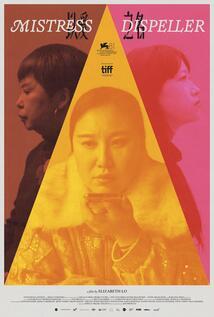

Hong Kong film director, producer, and cinematographer Elizabeth Lo's sophomore documentary is a fascinating exploration into the ways class, commitment, and culture shape contemporary China's marital economy. The film follows Mrs. Li, who hires a professional "mistress dispeller" to go undercover and break up her husband's extramarital affair with a young woman named Fei Fei. The professional dispeller, Wang Zhenxi, known as Teacher Wang to all the participants, is frequently hired to break up affairs through deception. Divorce rates are on the rise in China, and a divorce is expensive compared to the cost of hiring someone who provides dispelling services. Once Teacher Wang gains access to a husband in this situation, she sets out to befriend his mistress and convinces her to end the affair. Through the intensely personal lens through which this specific case is viewed, we gain insight into how strange dating and marriage in contemporary China must feel.
Mistress Dispeller is one of those documentaries where you scratch your head, wondering how the hell the participants ever consented to participate, and how the filmmakers gained such intimate access. I was surprised when the credits rolled to see that I was acquainted with one of the producers, American Emma Miller. From her, I later learned that, like many documentaries, the Li family was not originally the central focus of the project, which initially followed several subjects. The incredible footage dictated the shape and the ultimate subject of the movie (plus the willingness of each party in this odd four-way love triangle to sign off on their participation in the film.
Like Teacher Wang and most of the people who hired her during the shooting, Mrs. Li was aware of the focus of Lo's movie, but Mr. Li. and Fei Fei, like most of the other filmed subjects, were told this movie was a documentary about "love and relationships in modern China." Not exactly a lie, but the kind of thing that requires re-consent to be featured in it once the movie was finished. There were numerous backup plans in motion throughout production, and many subjects dropped out at various stages of the process during the three-year shooting period. The Lis were the one couple involved where no one dropped out, and everyone came across as sympathetic in one way or another. Some of the behaviours the crew filmed other participants engaging in were far less endearing.
Much of this movie unfolds in long takes, allowing the camera to observe how the various characters interact with one another. Sometimes, the filmmakers would leave the room with the camera still rolling, capturing the couple in conversation with as much "privacy" as possible. It's the type of patient documentary filmmaking that enables us to see multifaceted behaviors in the same individual. We see each person as they present the different versions of themselves that they show to the various people in their lives, as well as guess at how much deception they are creating by their awareness that they are being filmed.
This is all quite fascinating, as deception and cheating, forgiveness and trust are viewed so differently in China compared to America. Maintaining face plays a different role in Chinese culture and in America. In our culture, especially since 2016, we've become obsessed with the concept of "cucking" or not being viewed as a cuckold, so our idea of saving face has to do with revenge for betrayal. In contrast, for Chinese couples like the Lis, the focus is more on returning things to the way they were before a betrayal occurred, and carrying on as if it had not happened. A major part of Teacher Wang's job is just getting people to say things out loud (to her, if not to one another) that they wouldn't say otherwise. Then she manipulates the truth and steers people in the most socially acceptable direction. Mr. Li may not even want to leave his wife, because of the shame it would bring, so in many ways, he needs Teacher Wang's help to disentangle himself as much as his wife does.
All of this makes for a riveting fly-on-the-wall glimpse into a totally different type of conflict resolution than most Western audiences are used to. The film also raises numerous questions about how old traditions, coupled with the outcomes of years of China's former one-child policy, are radically reshaping how people of all ages and social statuses seek their mates. Much of what gets explored in this movie feels relevant to how relationships have been changing outside of China as well. Since cinema itself is inherently a form of deception, it makes film the ideal medium to showcase how people can be manipulated into "doing the right thing," which sometimes involves convincing them to tell lies in order to uncover some deeper truths.
A fascinating fly-on-the-wall glimpse into the ways class, commitment, and culture shape contemporary China's marital economy, and how being manipulated into telling lies can sometimes uncover a deeper truth.




